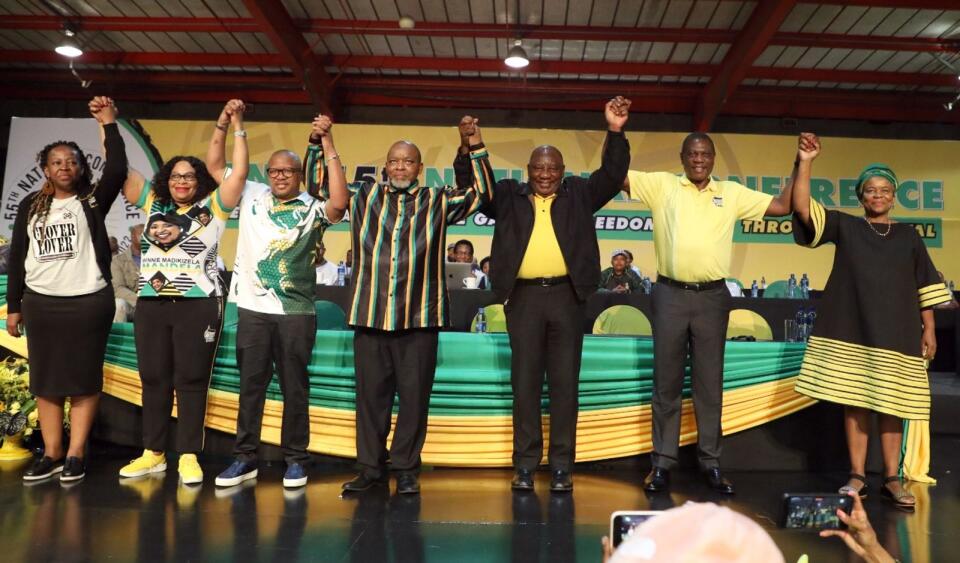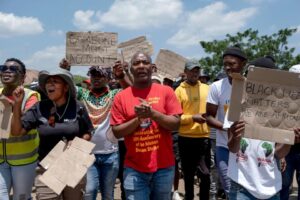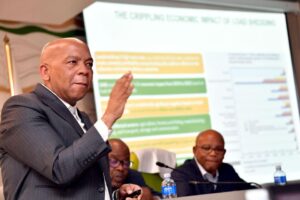THE ANC’s top seven leadership elected at the party’s 55th elective conference held at the Nasrec Conference Centre, Johannesburg in December 2022. Nothing justifies the ANC leaders’ navel-gazing amid a social, political and economic crisis in the country, says the writer. Picture: Independent Archives
Dr. Trevor Ngwane
WAS it asking too much of the leaders of the ANC to focus their recent National Executive Committee (NEC) meeting on how to alleviate the hardship and suffering caused by the rising levels of poverty, unemployment, inequality, crime and infrastructure deterioration besetting the country?
The highest decision-making body of the party heading the Government of National Unity (GNU) spent its time debating internal organizational matters, whether to ‘dissolve or reconfigure’ its Gauteng and KwaZulu-Natal provincial executive committees.
Forgive the frustrated residents and citizens who think that the ANC is fiddling while Rome burns. For example, people who live in Johannesburg, the country’s biggest city, often wake up to taps that run dry because of perennial water shortages. Worry and concern about the water crisis is not an exaggeration given fresh memories of a cholera outbreak in Hammanskraal, an area in the nearby City of Tshwane Metropolitan Municipality, which left 23 people dead due to poor water quality in May 2023.
Nothing justifies the ANC leaders’ navel-gazing amid a social, political and economic crisis in the country. The NEC was concerned about the electoral loss of support in the 2024 elections which saw the party lose its parliamentary majority leading to the formation of a GNU. The party says it noted that the greatest decline in votes occurred in KwaZulu-Natal where it went down from 54.22% in 2019 to 17% in 2024 while Gauteng fell from 50.19% to 35%. However, singling out and removing from office two elected provincial leaderships might be a case of the ANC cutting off its nose to spite its face.
It is unwise for the party to ignore the wishes of its membership and, in midstream and top-down fashion, remove its elected officials from office because of after-the-fact electoral assessments. It is not as if other ANC provinces and their leaderships did brilliantly in the last couple of national and local government elections. The ANC lost its support from the voters not because of this or that leader or leadership collective. The ANC is getting its just desserts as a result of its failure to carry out its mandate as the leader of the government of national liberation and for neglecting the needs of the masses.
The city of Johannesburg is a historical site and symbol of the working-class struggle for political and economic emancipation from colonial oppression and capitalist exploitation. Millions of people came to the city searching for a better life. A majority of them were workers. In the poem, “The Small Gateway to Heaven”, Alfred Qabula recalls workers enticed to leave their rural homesteads to work in eGoli being told that: “There are mountains of meat / There a man’s teeth become loose from endless chewing”.
The shiny metal promised turned out to be fools’ gold. What awaited was hardship, pain and suffering. “Bonang chaba sa heso / Se fedile mona Gauteng” (See our nation, it has perished here in Gauteng), laments Mirriam Makeba in her song “Hauteng”. Linking the past to the present, Lesego Rampolokeng ’s poem opens with: “Johannesburg my city / Paved with judas gold / Deception and lies / Dreams come here to die”. Further: “Nothing is secure / Neither politics nor prayer / Can secure the future”.
Has life improved significantly for the working class and the poor in the post-apartheid democratic Johannesburg? The municipality’s marketing department brands it, “a world-class city”. But those who live in Johannesburg have a different story to tell. Problems with water, roads, electricity, streetlights, housing, clinics, transport, safety and security, among others, are of concern to residents. Spectacular and horrific events such as the fire that killed 77 people at Number 80 Albert Street and the underground explosion that ripped Lillian Ngoyi Street apart crystallize the challenges faced by those who live in the city.
It is an expensive city to live in. High electricity and water tariffs, unaffordable rates and taxes, poor and inaccurate municipal billing are normal headaches of living in Jozi. The cash nexus rules supreme, everything has a price tag. Corruption is a tradition and municipal officials are as likely as not to demand “cool drink” when performing their duties. The city has had nine mayors in eight years making political governance a farce and giving coalition politics a bad name.
For many people, the changing identity of Johannesburg as an apartheid city where Black people were chased like wild game by police to a neoliberal city where every morsel is soaked in sorrow and won through blood, sweat and tears, the more things change the more they stay the same. The transition from racial apartheid to class apartheid happened on the back of meeting the aspirations of the Black bourgeoisie without challenging the interests of white monopoly capital, a reality that defines the contours of the city in a brazen and painful way.
The trajectory of the struggle of the workers is not preset, nor does the progression from oppression and exploitation to political and economic emancipation follow a unilinear path. Nothing is guaranteed. The hopes and dreams that catapulted the ANC into power were trampled upon and not realized. The masses made the ANC pay in the 2024 elections, but its leadership has clearly not learned its lesson. It continues to prioritise self-enrichment above the needs of the masses.
A study of the administration of deceased persons’ property in South Africa conducted by the London School of Economics researchers in 2024 revealed the continuation of gaping racial wealth divides. Only 3% of Black people had inheritable wealth of at least R250 000 while for White adults it was 45%. The vast majority of people do not enjoy private property in the form of inheritances and, as the rising levels of poverty, unemployment and inequality attest, in their everyday lives.
The unfulfilled dreams of the millions who flock to the city of Johannesburg are not realizable within a system in which only a tiny minority own the wealth. The ANC will go down defending a system which does not benefit the majority of the people.
* Dr. Trevor Ngwane is an activist scholar and senior lecturer at the University of Johannesburg.
** The views expressed in this article do not necessarily reflect the views of The African.





